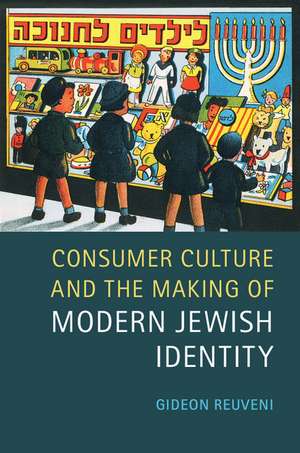Consumer Culture and the Making of Modern Jewish Identity
Autor Gideon Reuvenien Limba Engleză Hardback – 6 aug 2017
| Toate formatele și edițiile | Preț | Express |
|---|---|---|
| Paperback (1) | 286.13 lei 6-8 săpt. | |
| Cambridge University Press – 18 aug 2021 | 286.13 lei 6-8 săpt. | |
| Hardback (1) | 693.89 lei 6-8 săpt. | |
| Cambridge University Press – 6 aug 2017 | 693.89 lei 6-8 săpt. |
Preț: 693.89 lei
Preț vechi: 779.66 lei
-11% Nou
Puncte Express: 1041
Preț estimativ în valută:
132.79€ • 144.19$ • 111.54£
132.79€ • 144.19$ • 111.54£
Carte tipărită la comandă
Livrare economică 22 aprilie-06 mai
Preluare comenzi: 021 569.72.76
Specificații
ISBN-13: 9781107011304
ISBN-10: 1107011302
Pagini: 280
Ilustrații: 32 b/w illus.
Dimensiuni: 160 x 235 x 22 mm
Greutate: 0.51 kg
Editura: Cambridge University Press
Colecția Cambridge University Press
Locul publicării:New York, United States
ISBN-10: 1107011302
Pagini: 280
Ilustrații: 32 b/w illus.
Dimensiuni: 160 x 235 x 22 mm
Greutate: 0.51 kg
Editura: Cambridge University Press
Colecția Cambridge University Press
Locul publicării:New York, United States
Cuprins
Part I. Narratives of Belonging: 1. Producers, consumers, Jews and antisemitism in German historiography; 2. Ethnic marketing and consumer ambivalence in Weimar Germany; 3. The Jewish question and the changing regimes of consumption; 4. What makes a Jew happy? Longings, belongings and the spirit of modern consumerism; Part II. The Politics of Jewish Consumption: 5. Emancipation through consumption; 6. Boycott, economic rationality and Jewish consumers in interwar Germany; 7. Advertising national belonging; 8. The consumption of Jewish politics; Part III. Homo Judaicus Consumerus: 9. The cost of being Jewish; 10. Place and space of Jewish consumption; 11. The world of Jewish goods; 12. Spending power and its discontents; 13. Beyond consumerism: the bridge, the door and the cultural economy approach to Jewish history.
Recenzii
'Moving beyond the stereotypes, this brilliant, wide-ranging, innovative, meticulously researched and very readable history of how Jews were targeted as consumers and Jewish consumer practices sheds new light on Jews' relation to modernity. Reuveni takes the reader from Europe to the United States and Israel, showing how buying, or refusing to buy, goods had political, social and cultural consequences.' Leora Auslander, University of Chicago
'In this pioneering book Gideon Reuveni rereads the history of Jewish life in Weimar Germany from the fresh perspective of consumerism, with an eye toward how daily habits of getting, spending, eating and furnishing were inseparable from larger questions of belonging, integration and exclusion amid the tumultuous conditions of interwar Germany.' Paul Betts, St Anthony's College, Oxford
'In this pioneering book Gideon Reuveni rereads the history of Jewish life in Weimar Germany from the fresh perspective of consumerism, with an eye toward how daily habits of getting, spending, eating and furnishing were inseparable from larger questions of belonging, integration and exclusion amid the tumultuous conditions of interwar Germany.' Paul Betts, St Anthony's College, Oxford
Notă biografică
Descriere
This book investigates the intersection between consumption, identity and Jewish history in Europe.
